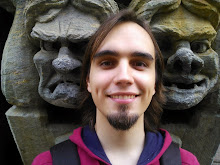If it were not for various states of heightened creativity and flow, there would be no underlying reason for starting this blog. In fact, this journal is rooted in altered states of consciousness. The very process of writing brings you into a different pattern of being and dialoguing with reality. If searching for heightened states in some ways can be likened to fishing, then this blog is devoted to catching really big fish. (For those interested in further exploration of this metaphor, I recommend a beautiful book Catching the Big Fish: Meditation, Consciousness, and Creativity by David Lynch.)
The big fish of this blog is any states of profound appreciation and curiosity for whatever is arising moment to moment in the ocean of experience. The states in question correlate with radical deepening of one's own capacity to make sense of existence. Whether existence makes sense or not seems to depend upon qualitative features of the state of consciousness you are currently in. It is not just that an altered state helps you look at the same situation from a different angle, thus bringing, say, insight instead of despair; it is more likely that a change in functioning of consciousness helps to (partially) construct a different occasion as it literally enacts a new worldspace. A worldspace always has an array of features attached to it; and one of those features can be a degree of whether (and how much) I feel my existence makes sense or not.
This is not simply a shift in subjective (mental or emotional) processes of assessing the world, for (as it became clear in the 20th century) dynamics in consciousness corresponds with dynamics in the objective brain and behavior. Any shift in the pattern of subjective functioning correlates with some change in the objective brain state and other components of the overall organism system (such as endocrine regulation and so on). Furthermore, as shown by research, if plugging into an altered state is done repeatedly over a long course of time (e.g. in longterm meditation training), this may even lead to morphological change in the brain structure (in case of meditation there is evidence for increased cortical thickness [Lazar S. W. et al, 2005]).
Thus, there is something intrinsically and crucially real to the very fact that we can cultivate a habit of plugging into (and co-creating) certain domains of experience (by tapping into various states of consciousness). If we habitually tap into meaningful modes of being, we actually affect our biology. (And our subjective attitudes can do both good and harm; for instance, a recent study [O’Donovan A. et al., 2008] has shown that dispositional pessimism may contribute to telomere shortening, which increases risk for disease and early mortality in post-menopausal women.) This also influences the quality of our interaction with others, thus helping to engage in a more healthy kind of relationships with our sociocultural environment.
Epistemologically, in the course of perceptual microgenesis we, the subjects, do not just reflect a pregiven world, the objects; in broad terms, we actually co-construct the stream of objects while similtaneously being co-constructed ourselves (through, for instance, self-reflection, our relationships with others, and even food that we eat) as we're naturally immersed into the vast fields of our sociocultural environment. It is worth mentioning that Ken Wilber speaks of this construction process as of tetra-construction, because such a process always involves a matrix of subjective, objective, (intersubjective) cultural, and (interobjective) socioenvironmental dimensions—and not just the good 'ole pure subject and object dichotomy. (Of course, these constructed matrices seem to behave as resonating fields of various degrees of complexity, flexibility, and structure that may be more or less crystallized through conditioning and reinforcement.)
Ironically, by the 21st century we've become extremely adept at both individually and collectively deconstructing our flows of experience into the sense of dullness and despair. In some sense, these socially-reinforced habits of deconstruction, depersonalization, and derealization are our constructions, too; this understanding makes them objects of our awareness, which is important in order to use those as a means to fulfilling our dreams rather than enforcing nightmares. This might be a propitious time for bringing more mindfulness to the patterns of being that we construct in the dynamic multilevel system of our existence so as to enable a space of more creative ways to making sense of whatever it is that we are.
Saturday, October 24, 2009
Catching really big fish
Subscribe to:
Post Comments (Atom)




No comments:
Post a Comment